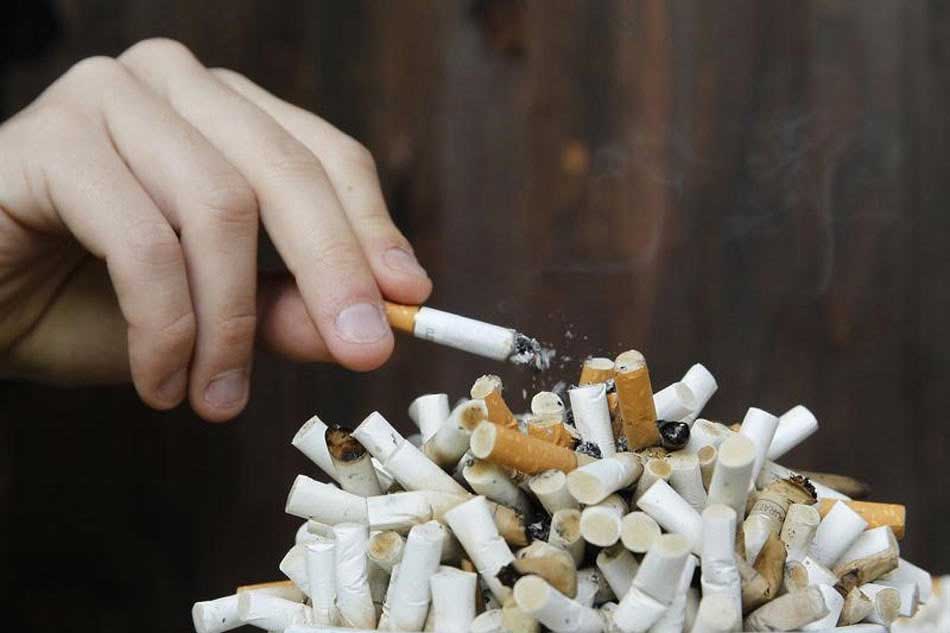Smoking ban executive order still awaits Duterte signature | ABS-CBN
ADVERTISEMENT

Welcome, Kapamilya! We use cookies to improve your browsing experience. Continuing to use this site means you agree to our use of cookies. Tell me more!
Smoking ban executive order still awaits Duterte signature
Smoking ban executive order still awaits Duterte signature
Trishia Billones,
ABS-CBN News
Published Jan 19, 2017 12:56 PM PHT
MANILA - An executive order for the stricter implementation of the smoking ban in public places has been drafted and is still awaiting President Rodrigo Duterte's signature, the Health Secretary said Thursday.
MANILA - An executive order for the stricter implementation of the smoking ban in public places has been drafted and is still awaiting President Rodrigo Duterte's signature, the Health Secretary said Thursday.
Secretary Paulyn Ubial told ANC's Headstart the draft was finished last year and she is hoping Duterte signs it "within the month."
Secretary Paulyn Ubial told ANC's Headstart the draft was finished last year and she is hoping Duterte signs it "within the month."
She said Duterte, a long-time mayor of Davao City, had asked her to draft the executive order similar to what the city had been implementing on "100% smoke-free environment in public places."
She said Duterte, a long-time mayor of Davao City, had asked her to draft the executive order similar to what the city had been implementing on "100% smoke-free environment in public places."
"The executive order will actually mandate all the agencies of government, including the local government to implement this 100% smoking ban in all public places. It's not just Metro Manila," she said.
"The executive order will actually mandate all the agencies of government, including the local government to implement this 100% smoking ban in all public places. It's not just Metro Manila," she said.
ADVERTISEMENT
"It's an order to the executive branch. It's up to the local government units also to draft their, shall we call, ordinances to implement this executive order. It's different from a law," she added.
"It's an order to the executive branch. It's up to the local government units also to draft their, shall we call, ordinances to implement this executive order. It's different from a law," she added.
The EO, Ubial said, is a clear signal to the members of the branch to implement systems and information drives to work together to be able to prevent children, the poor, and the public from smoking in public places.
The EO, Ubial said, is a clear signal to the members of the branch to implement systems and information drives to work together to be able to prevent children, the poor, and the public from smoking in public places.
According to the results of the 2009 Global Adult Tobacco Survey (GATS), at least 17.3 million Filipino adults age 15 years and older smoke tobacco.
According to the results of the 2009 Global Adult Tobacco Survey (GATS), at least 17.3 million Filipino adults age 15 years and older smoke tobacco.
The study also showed that Filipinos mainly smoke cigarettes, which include manufactured cigarettes and hand-rolled cigarettes. Cigarettes are smoked by 47 percent of men and by 9 percent of women. On the average, male smokers consume 11 cigarettes per day while female daily smokers consume 7 cigarettes per day.
The study also showed that Filipinos mainly smoke cigarettes, which include manufactured cigarettes and hand-rolled cigarettes. Cigarettes are smoked by 47 percent of men and by 9 percent of women. On the average, male smokers consume 11 cigarettes per day while female daily smokers consume 7 cigarettes per day.
In 2012, the Philippine Congress enacted Republic Act 10351 or the Sin Tax Reform Law, which restructured the excise tax on alcohol and tobacco products.
In 2012, the Philippine Congress enacted Republic Act 10351 or the Sin Tax Reform Law, which restructured the excise tax on alcohol and tobacco products.
ADVERTISEMENT
Ubial asserted that the implementation of the law had decreased the number of Filipino smokers to 23 percent from 28 percent by 2015.
Ubial asserted that the implementation of the law had decreased the number of Filipino smokers to 23 percent from 28 percent by 2015.
"In our disaggregation of data, it showed that the poor, which is actually the target of the sin tax, were smoking less and the youth sector is smoking less," she said.
"In our disaggregation of data, it showed that the poor, which is actually the target of the sin tax, were smoking less and the youth sector is smoking less," she said.
For this, Ubial disagrees with the proposal to keep the two-tiered tax system for tobacco. She said instead of making smokers quit their habit, this only prompted them to shift to cheaper cigarettes.
For this, Ubial disagrees with the proposal to keep the two-tiered tax system for tobacco. She said instead of making smokers quit their habit, this only prompted them to shift to cheaper cigarettes.
"If you have a one-tiered then it’s now the fungibility or the economic people were saying that the price becomes a deterrent to the habit," she said.
"If you have a one-tiered then it’s now the fungibility or the economic people were saying that the price becomes a deterrent to the habit," she said.
"The idea is to have single taxation so that there are no cheaper cigarettes and more expensive cigarettes, so that it becomes more expensive particularly to the lower socio-economic class. We want them to be the first ones to quit smoking," she added.
"The idea is to have single taxation so that there are no cheaper cigarettes and more expensive cigarettes, so that it becomes more expensive particularly to the lower socio-economic class. We want them to be the first ones to quit smoking," she added.
Read More:
ANC
ANC Top
ANC Exclusives
Paulyn Ubial
DOH
Department of Health
smoking
Rodrigo Duterte
smoking ban
ADVERTISEMENT
ADVERTISEMENT



